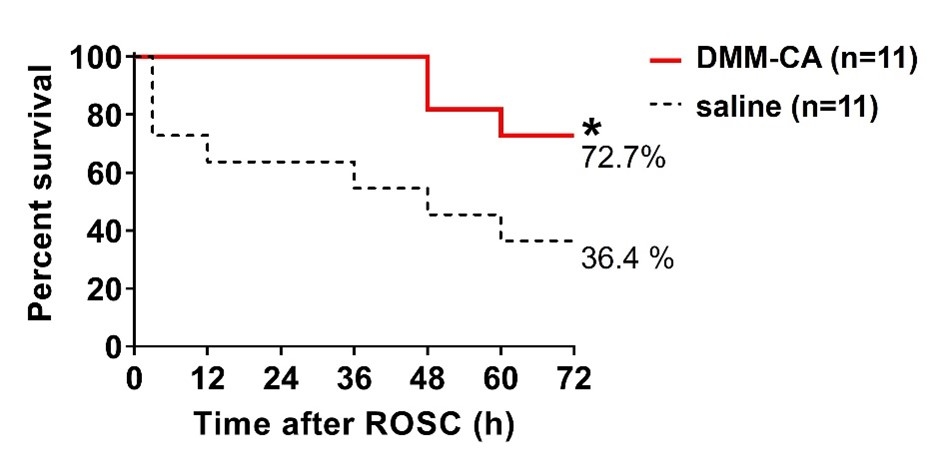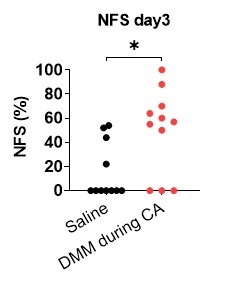Final ID: Su103
Targeting succinate metabolism for neuroprotection after cardiac arrest and resuscitation
Abstract Body: Background: Succinate dehydrogenase (SDH) is a key enzyme involved in succinate accumulation during ischemia and its subsequent oxidation upon reperfusion, leading to excessive reactive oxygen species production. Malonate, a competitive inhibitor of SDH, has emerged as a promising candidate for selective SDH inhibition to reduce reperfusion injury. However, studies targeting succinate metabolism for neuroprotection after cardiac arrest (CA) and cardiopulmonary resuscitation (CPR) are still extremely limited.
Methods and Results: Adult male Sprague-Dawley rats were intubated, mechanically ventilated, and instrumented under anesthesia. Microcatheters were inserted into the left femoral artery for monitoring blood pressure and the left femoral vein for drug administration. The animals were subjected to 10 minutes of asphyxial CA, followed by CPR with epinephrine injection and finger chest compressions. The animals were assigned to three groups based on intravenous drug injections: dimethyl malonate injected during CA (DMM-CA group, n = 11), dimethyl malonate injected at the initiation of CPR (DMM-STAT group, n = 8), and saline injected during CA (saline group, n = 11). The animals were extubated 2 hours post-resuscitation, then were returned to their cages with easily accessible food and water and were monitored in a rodent facility with controlled room temperature. At 72 hours after a return of spontaneous circulation (ROSC), the survival rates were 72.7% in the DMM-CA group, 50.0% in the DMM-STAT group, and 36.4% in the saline group. The DMM-CA group exhibited a significantly higher survival rate (Kaplan–Meier analysis, P < 0.05) and better neurological function scores at 72 hours after ROSC (Mann-Whitney U test, P < 0.05) compared to the saline group. There was no statistically significant difference in survival rates between the DMM-STAT and saline groups. To further test the impact of succinate accumulation during CA on survival, dimethyl succinate was intravenously administered during CA in a separate group of animals subjected to 10 minutes of asphyxial CA (n = 6). None of the animals that received dimethyl succinate survived for 48 hours, confirming that succinate accumulation during CA contributes to mortality after CPR.
Conclusion: Our results demonstrated that SDH inhibition was beneficial when initiated during CA in rats. Further studies are warranted to elucidate the impact of succinate metabolism on outcomes after CA and CPR.
Methods and Results: Adult male Sprague-Dawley rats were intubated, mechanically ventilated, and instrumented under anesthesia. Microcatheters were inserted into the left femoral artery for monitoring blood pressure and the left femoral vein for drug administration. The animals were subjected to 10 minutes of asphyxial CA, followed by CPR with epinephrine injection and finger chest compressions. The animals were assigned to three groups based on intravenous drug injections: dimethyl malonate injected during CA (DMM-CA group, n = 11), dimethyl malonate injected at the initiation of CPR (DMM-STAT group, n = 8), and saline injected during CA (saline group, n = 11). The animals were extubated 2 hours post-resuscitation, then were returned to their cages with easily accessible food and water and were monitored in a rodent facility with controlled room temperature. At 72 hours after a return of spontaneous circulation (ROSC), the survival rates were 72.7% in the DMM-CA group, 50.0% in the DMM-STAT group, and 36.4% in the saline group. The DMM-CA group exhibited a significantly higher survival rate (Kaplan–Meier analysis, P < 0.05) and better neurological function scores at 72 hours after ROSC (Mann-Whitney U test, P < 0.05) compared to the saline group. There was no statistically significant difference in survival rates between the DMM-STAT and saline groups. To further test the impact of succinate accumulation during CA on survival, dimethyl succinate was intravenously administered during CA in a separate group of animals subjected to 10 minutes of asphyxial CA (n = 6). None of the animals that received dimethyl succinate survived for 48 hours, confirming that succinate accumulation during CA contributes to mortality after CPR.
Conclusion: Our results demonstrated that SDH inhibition was beneficial when initiated during CA in rats. Further studies are warranted to elucidate the impact of succinate metabolism on outcomes after CA and CPR.
More abstracts on this topic:
Adeno-associated virus-mediated gene delivery of PERM1 enhances cardiac contractility and mitochondrial biogenesis in mice.
Sreedevi Karthi, Doku Abigail Oforiwaa, James Amina, Do Sara, Zaitsev Alexey, Warren Junco
Adipocyte-derived small extracellular vesicles and miR-29c-3p promoted apoptosis of cortical neurons in obese mice after resuscitation via downregulating neuronal MCL1Gan Lu, Deng Yalu, Yao Peng, Zhou Tingyuan, Zhou Chao, Cao Yu


